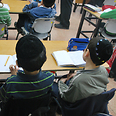
Haredization of education system?
The new school year
opened this week as the Central Bureau of Statistics published a report
in which it revealed that in 2017 the ratio of State education will be 41% compared to 52% in 2001 and the number of students in haredi educational institutions will be 18% compared with 12% (a growth rate of 91%).
A Ynet and Gesher joint poll discovered that a majority of the public is concerned with the impact the haredi sector will have on Israel's students, at the same time, calling for schools affiliated with the haredi education system to be obligated to include the core curriculum in their education systems.
School's Out
Data published by CBS reveals that while haredi, Arab education systems have 91%, 55% growth rate respectively, State education system's growth rate stands at only 2%
The poll was conducted by Panels Ltd. Through their internet response panel 'Panel4All' among 501 people – a national representative sample of the adult Jewish population in Israel.
The maximum sampling error was 4.4%.
Some 74% of those participating in the poll believe that the State of Israel should force haredi educational institutions to teach the core curriculum – science, math, English and civics (including 92% of secular respondents, 80% traditional and 54% of religious).
Some 19% of those surveyed were opposed to obligating haredi education institutions to implement the core curriculum in their classrooms (85% of which were haredi respondents). Some 6% said they had no opinion on the matter.
Over 50% of survey participants admitted that they were concerned at one level or another by the 'haredization' of the education system: 27% admitted that they were extremely concerned by the possibility of having a majority of haredi students and 27% said they were "relatively concerned."
In contrast, 23% said they were not concerned at all and 20% said they "were not too concerned" about the issue. The rest of the poll participants had no opinion on the matter.
Segmentation according to religious denomination revealed that among secular respondents 78% indicated that they were concerned in some way or another as did 54% of traditional respondents. The religious and haredi respondents were unconcerned by the scenario – with 79% and 95% correspondingly.
Fewer scientists, scholars?
Some 44% of the concerned respondents explained that they felt concerned over the possibility of Israel's becoming a 'halachic State' while 23% were concerned with the expected drop in IDF enlistment numbers and 16% were concerned with the possible drop in the number of scientists, researchers, scholars and members of the academia.
Some 12% were concerned with the possible loss of personal liberties and 5% noted other concerns.
Meanwhile, among those who were not concerned by the haredi impact, 32% said that this would see Israel return to its Jewish values and 27% said that either way, the haredi public was undergoing an integration process with Israeli society.
Some 20% believe that in becoming a majority, the haredi sector would become more open – so they see the demographic trend as a positive event.
Gesher Executive Director Ilan Geal-Dor said that "the results prove that we must all act to decrease the tensions between the (different) sectors in the State of Israel. Haredim are in the midst of a growth trend within Israeli society and we need to understand that they are no longer a marginal group.
"Together we must understand the challenges and help them to integrate into the workforce and create opportunities for meetings to reduce tensions and fears."















